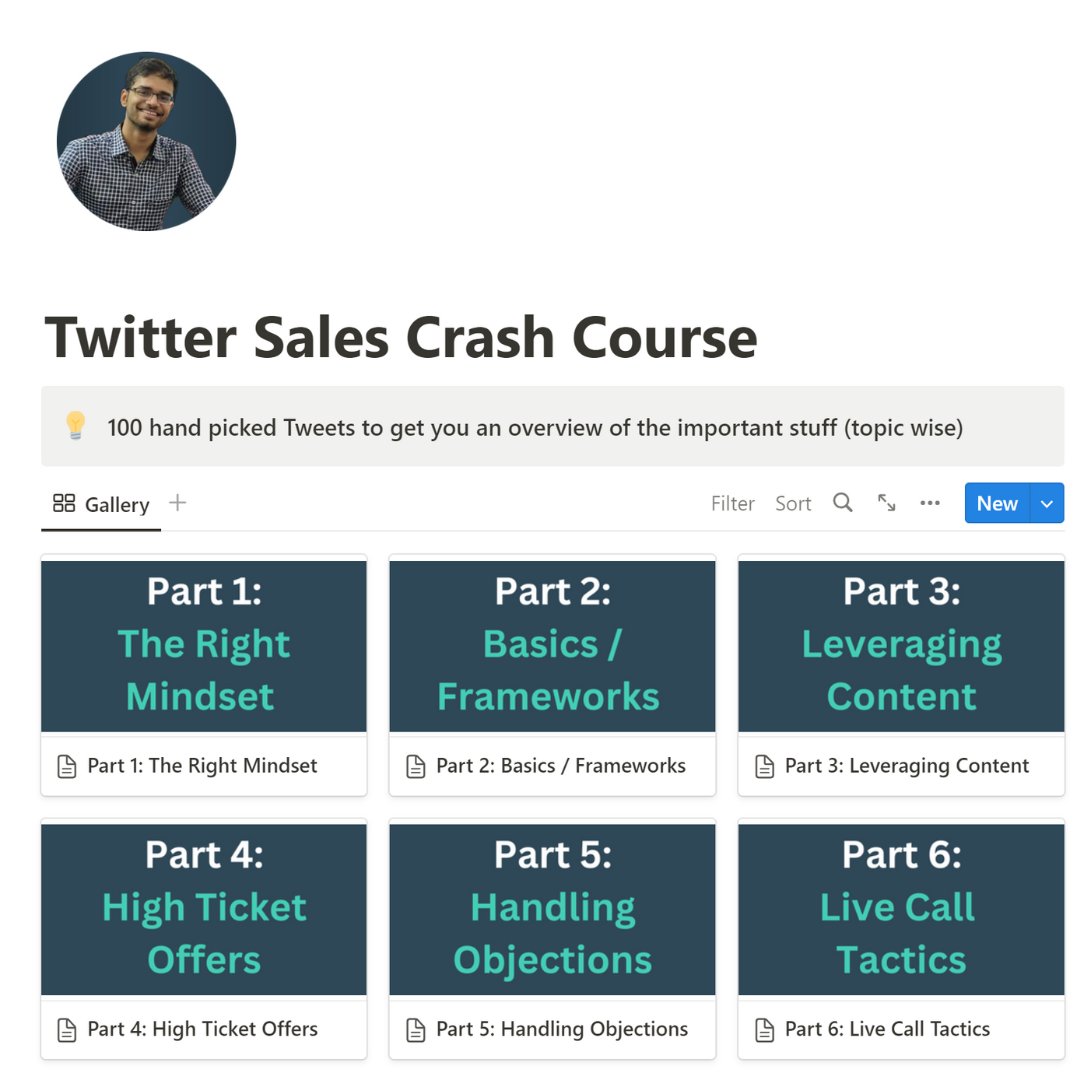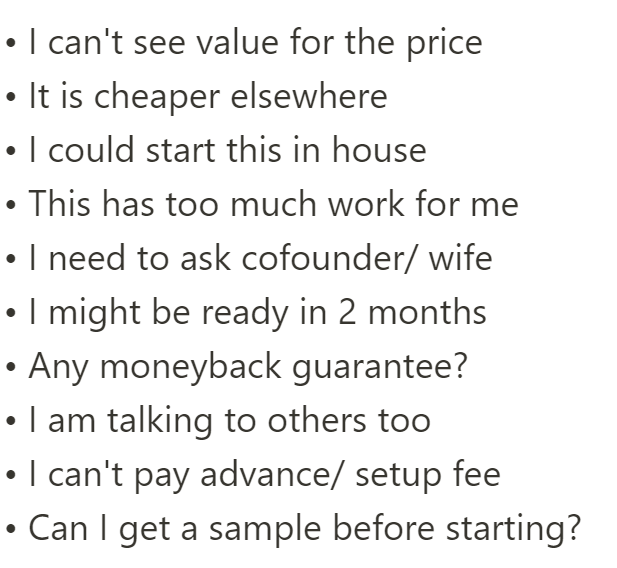Thread
100 days ago I started learning Sales.
..After I watched
43,000$ in deals...
fail at the last stage🫤
Here's 7 Principles of Sales I wish I knew when starting out:
(+ Get your Free Twitter Sales Crash Course inside) 👉
..After I watched
43,000$ in deals...
fail at the last stage🫤
Here's 7 Principles of Sales I wish I knew when starting out:
(+ Get your Free Twitter Sales Crash Course inside) 👉
I tweeted 1 sales tip for the past 100 days.
Friends & founders alike have hugely complimented them
So I categorized & sequenced all 100 tips 🔥
To Get the Crash Course in your DMs, go to the 1st tweet
🔸Retweet it
🔸Comment "Sales" under it
(must be following)
72 hrs only
Friends & founders alike have hugely complimented them
So I categorized & sequenced all 100 tips 🔥
To Get the Crash Course in your DMs, go to the 1st tweet
🔸Retweet it
🔸Comment "Sales" under it
(must be following)
72 hrs only
5 years ago I thought sales was about scamming people out of their money.
Failing with my 1st startup woke me up to the importance of selling as a skill.
I have invested $1000s in coaching & 10s of hrs practicing it in past 3 mo.
80% of sales is handling objections (NOs)
See👉
Failing with my 1st startup woke me up to the importance of selling as a skill.
I have invested $1000s in coaching & 10s of hrs practicing it in past 3 mo.
80% of sales is handling objections (NOs)
See👉
Principle 1/
90% of all objections are smokes & mirrors.
They have nothing to do with the actual reason for someone not buying.
They are merely tools to be polite, find an easy out or actions in self interest.
BE SKEPTICAL
90% of all objections are smokes & mirrors.
They have nothing to do with the actual reason for someone not buying.
They are merely tools to be polite, find an easy out or actions in self interest.
BE SKEPTICAL
Principle 2/
There are only THREE true reasons of not buying and they correspond to the 3 Scales of Selling:
A) the offer /mechanism (eg does this actually work for my situation?)
B) sales person (eg can I trust this guy?)
C) likelihood of success (eg similar case studies?)
There are only THREE true reasons of not buying and they correspond to the 3 Scales of Selling:
A) the offer /mechanism (eg does this actually work for my situation?)
B) sales person (eg can I trust this guy?)
C) likelihood of success (eg similar case studies?)
Principle 3/
Every person has a different "min buying temperature" for each of the 3 scales.
Eg Person X who wants to sign you on behalf of their company might buy when:
- scale A is 2+/10 (ANY method)
- scale B is 5+/10 (GOOD people)
- scale C is 8+/10 (GREAT case studies)
Every person has a different "min buying temperature" for each of the 3 scales.
Eg Person X who wants to sign you on behalf of their company might buy when:
- scale A is 2+/10 (ANY method)
- scale B is 5+/10 (GOOD people)
- scale C is 8+/10 (GREAT case studies)
Principle 4/
Just like a guy proposing to a girl, you shouldn't pitch unless you are reasonably sure of a Yes!
This means the best way to deal with objections is to prevent them in the first place -
1) Ask leading Qs
2) Repeat their words back to them
youtu.be/CojS0DwflXc
Just like a guy proposing to a girl, you shouldn't pitch unless you are reasonably sure of a Yes!
This means the best way to deal with objections is to prevent them in the first place -
1) Ask leading Qs
2) Repeat their words back to them
youtu.be/CojS0DwflXc
Principle 5/
Your job thus becomes:
- deflecting any "fake objections"
- estimating their buying temps
- testing temp on scales ABC in that order
- hopefully closing the deal
Pro tip: asking if they have any more Qs is like inviting them to create more objections - BAD idea!
Your job thus becomes:
- deflecting any "fake objections"
- estimating their buying temps
- testing temp on scales ABC in that order
- hopefully closing the deal
Pro tip: asking if they have any more Qs is like inviting them to create more objections - BAD idea!
Principle 6/
The image below has the 10 common Fake objections.
Or "excuses" prospects use to not say Yes when you are pitching to them.
The solution is to have mini-stories or prepared answers to EACH of these.
Which redirects them to one of the 3 REAL objections.
Ikr? 🤯
The image below has the 10 common Fake objections.
Or "excuses" prospects use to not say Yes when you are pitching to them.
The solution is to have mini-stories or prepared answers to EACH of these.
Which redirects them to one of the 3 REAL objections.
Ikr? 🤯
Principle 7/
Now when handling the 3 "real objections", you go in the sequence of ABC as they are progressively harder to handle.
Understand that the sales process only BEGINs after the 1st objection (aka No said in a different manner).
Until now, you were just "talking" :
Now when handling the 3 "real objections", you go in the sequence of ABC as they are progressively harder to handle.
Understand that the sales process only BEGINs after the 1st objection (aka No said in a different manner).
Until now, you were just "talking" :
Solving A) the offer /mechanism
- Overview benefits
- Show them your unique mechanism
- Educate how you will save them time & have high ROI
Talk in the long term
[do not move on till this offer validation step is done]
- Overview benefits
- Show them your unique mechanism
- Educate how you will save them time & have high ROI
Talk in the long term
[do not move on till this offer validation step is done]
Solving B) the Salesperson
Ask: "If I was working with you for 3 years & pitched you this same offer, would you have said Yes?"
If they say yes, that means they just don't trust you enough yet.
Talk about your values, mission, backstory.
Show you will go the extra mile!
Ask: "If I was working with you for 3 years & pitched you this same offer, would you have said Yes?"
If they say yes, that means they just don't trust you enough yet.
Talk about your values, mission, backstory.
Show you will go the extra mile!
If you have solved scale B, there's only one thing left to do:
Solve C) likelihood of success
This is the hardest one to solve.
0 case studies?
- Talk about personal stories where you succeeded at hard things.
- If they are a dream client, consider working for less/ free
Solve C) likelihood of success
This is the hardest one to solve.
0 case studies?
- Talk about personal stories where you succeeded at hard things.
- If they are a dream client, consider working for less/ free
Now, I could only scratch the surface in this thread.
Sales is a vast subject in & of itself...
But I find that 20% of ideas can solve 80% of the problems.
And these 20% are the ones I handpicked to tweet for my Daily sales tip series.
Sales is a vast subject in & of itself...
But I find that 20% of ideas can solve 80% of the problems.
And these 20% are the ones I handpicked to tweet for my Daily sales tip series.
I categorized & sequenced all 100 of these Daily Sales tips 🔥
My hope is it saves you the time & suffering it cost me.
To Get the Twitter Sales Crash Course in your DMs, go to the 1st tweet
🔸Retweet it
🔸Comment "Sales" under it
(must be following)
72 hrs only
My hope is it saves you the time & suffering it cost me.
To Get the Twitter Sales Crash Course in your DMs, go to the 1st tweet
🔸Retweet it
🔸Comment "Sales" under it
(must be following)
72 hrs only


